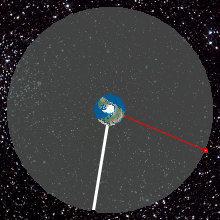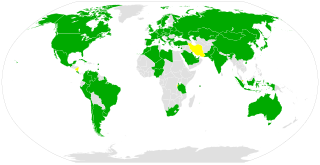
A geostationary orbit, also referred to as a geosynchronous equatorial orbit (GEO), is a circular geosynchronous orbit 35,786 km (22,236 mi) in altitude above Earth's equator, 42,164 km (26,199 mi) in radius from Earth's center, and following the direction of Earth's rotation.

Outer space is the expanse beyond celestial bodies and their atmospheres. It contains ultra-low levels of particle densities, constituting a near-perfect vacuum of predominantly hydrogen and helium plasma, permeated by electromagnetic radiation, cosmic rays, neutrinos, magnetic fields and dust. The baseline temperature of outer space, as set by the background radiation from the Big Bang, is 2.7 kelvins.

The Outer Space Treaty, formally the Treaty on Principles Governing the Activities of States in the Exploration and Use of Outer Space, including the Moon and Other Celestial Bodies, is a multilateral treaty that forms the basis of international space law. Negotiated and drafted under the auspices of the United Nations, it was opened for signature in the United States, the United Kingdom, and the Soviet Union on 27 January 1967, entering into force on 10 October 1967. As of March 2024, 115 countries are parties to the treaty—including all major spacefaring nations—and another 22 are signatories.

Diplomatic recognition in international law is a unilateral declarative political act of a state that acknowledges an act or status of another state or government in control of a state. Recognition can be accorded either on a de facto or de jure basis. Partial recognition can occur if many sovereign states refuse to recognize an entity as a peer. Recognition can be a declaration to that effect by the recognizing government or may be implied from an act of recognition, such as entering into a treaty with the other state or making a state visit. Recognition may, but need not, have domestic and international legal consequences. If sufficient countries recognise a particular entity as a state, that state may have a right to membership in international organizations, while treaties may require all existing member countries unanimously agreeing to the admission of a new member.

Space law is the body of law governing space-related activities, encompassing both international and domestic agreements, rules, and principles. Parameters of space law include space exploration, liability for damage, weapons use, rescue efforts, environmental preservation, information sharing, new technologies, and ethics. Other fields of law, such as administrative law, intellectual property law, arms control law, insurance law, environmental law, criminal law, and commercial law, are also integrated within space law.

Colonization of the Moon is a process or concept employed by some proposals for robotic or human exploitation and settlement endeavours on the Moon. Settling of the Moon is, therefore, a more specific concept of lunar habitation, for which the broader concept of colonization is often used as a synonym, a use that is contested in the light of colonialism and its claiming of space.

Gibraltar, a British Overseas Territory, located at the southern tip of the Iberian Peninsula, is the subject of a territorial claim by Spain. It was captured in 1704 during the War of the Spanish Succession (1701–1714). The Spanish Crown formally ceded the territory in perpetuity to the British Crown in 1713, under Article X of the Treaty of Utrecht. Spain later attempted to recapture the territory during the thirteenth siege (1727) and the Great Siege (1779–1783). British sovereignty over Gibraltar was confirmed in later treaties signed in Seville (1729) and the Treaty of Paris (1783).
The Agreement Governing the Activities of States on the Moon and Other Celestial Bodies, better known as the Moon Treaty or Moon Agreement, is a multilateral treaty that turns jurisdiction of all celestial bodies over to the participant countries. Thus, all activities would conform to international law, including the United Nations Charter.
The International law bearing on issues of Arab–Israeli conflict, which became a major arena of regional and international tension since the birth of Israel in 1948, resulting in several disputes between a number of Arab countries and Israel.

Extraterrestrial real estate refers to claims of land ownership on other planets, natural satellites, or parts of space by certain organizations or individuals. Previous claims are not recognized by any authority, and have no legal standing. Nevertheless, some private individuals and organizations have claimed ownership of celestial bodies, such as the Moon, and are actively involved in "selling" parts of them through certificates of ownership termed "Lunar deeds", "Martian deeds" or similar.
An international zone is any area not fully subject to the border control policies of the state in which it is located. There are several types of international zones ranging from special economic zones and sterile zones at ports of entry exempt from customs rules to concessions over which administration is ceded to one or more foreign states. International zones may also maintain distinct visa policies from the rest of the surrounding state.
Global commons is a term typically used to describe international, supranational, and global resource domains in which common-pool resources are found. Global commons include the earth's shared natural resources, such as the high oceans, the atmosphere and outer space and the Antarctic in particular. Cyberspace may also meet the definition of a global commons.
The development of Ugandan space initiatives has been largely shaped by that country's position on the equator. Its history is marked by an early involvement in issues of space law, and in 2022 by the launch of its first satellite, PearlAfricaSat-1.
Space jurisdiction, a field addressing what countries can enforce various laws in space, has become more important as the private sector enters the field of space tourism. Under the Outer Space Treaty of 1967, while space and celestial bodies cannot be appropriated by nations, objects launched into space and personnel on board them remain under the jurisdiction of the state of registry.
Space policy is the political decision-making process for, and application of, public policy of a state regarding spaceflight and uses of outer space, both for civilian and military purposes. International treaties, such as the 1967 Outer Space Treaty, attempt to maximize the peaceful uses of space and restrict the militarization of space.

The Convention on Registration of Objects Launched into Outer Space was adopted by the United Nations General Assembly in 1974 and went into force in 1976. As of February 2022, it has been ratified by 72 states.

The politics of outer space includes space treaties, law in space, international cooperation and conflict in space exploration, international economics, and the hypothetical political impact of any contact with extraterrestrial intelligence.

Common heritage of humanity is a principle of international law that holds the defined territorial areas and elements of humanity's common heritage should be held in trust for future generations and be protected from exploitation by individual nation states or corporations.

Asgardia, also known as the Space Kingdom of Asgardia and Asgardia the Space Nation, is a micronation formed by a group of people who have launched a satellite into Earth orbit. They refer to themselves as "Asgardians" and they have given their satellite the name "Asgardia-1". They have declared sovereignty over the space occupied by and contained within Asgardia -1. The Asgardians have adopted a constitution and they intend to access outer space free of the control of existing nations and establish a permanent settlement on the Moon by 2043.

Space sustainability aims to maintain the safety and health of the space environment.












